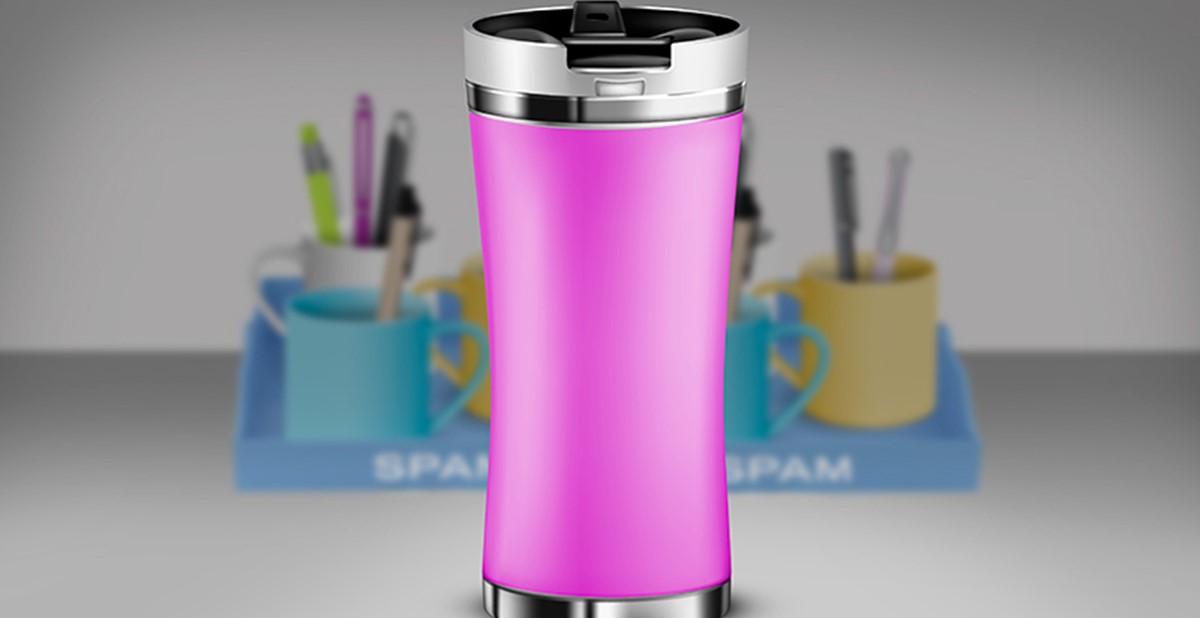Spam Alternatives

A while back, I read a Seth Godin blog that examined effective messaging and how the more personal the message, the more relevant it was. Godin, a bestselling author and marketing savant, gave examples of large corporations that were using a one-size-fits-all approach to communication, and he explained why it didn’t work. Conversely, he also shared examples of spot-on messages sent to targeted audiences that were highly effective.
That blog post got me thinking about how promotional products are an advertising/messaging medium and how, in the past, I had been guilty of helping clients, in essence, spam their customers and prospects.
A common promotional-products-as-spam application is the trade-show giveaway: “Look! We have pens in a bowl and we don’t care who you are. Grab as many as you can carry.”
After becoming anti-spam “enlightened,” I came up with some pretty cool ideas for clients that turned into very nice orders. Here’s a sample that may help inspire you.
Mugged
A client called me up: “Joe, I can get 1,000 four-color process coffee mugs for 99 cents each. I want to give you the business. Can you match that price?”
Had I been in my Joe-The-Mug-Guy phase, I would have hopped on SAGE Online, found some 99-cent mugs and sold them to my client. Fortunately, I drank PPAI’s promotional-products-are-an-advertising-medium Kool-Aid and came up with this response instead:
Joe: “Sounds interesting. To whom will you be giving those mugs?”
Client: “My best customers.”
Joe: “On average, how much do your best customers buy from you each year?”
Client: “Around $7,000.”
Joe: “If you were one of your best customers and got a 99-cent coffee mug, what would you think?”
Client: “Quite frankly, I’d be pissed off.”
Joe: “OK, let’s think of it this way: your client gets a 99-cent mug, looks at it once, puts it in the cupboard or throws it away. That single impression costs you 99 cents, or $999 per thousand [impressions].”
Client: “You know, you are right. That’s expensive.”
Joe: “Now let’s say, for grins, you give each of your best customers a $25, personalized, laser-engraved, heavy-duty metal travel mug. My experience tells me that it will become their favorite, they’ll use it every day and will use it for at least a year. What do you think your cost per impression will be?”
Client: “OK, Einstein, you do the math for me.”
Joe: “Less than four cents.”
Client: “No $#/+!” [Remember, this is an actual conversation.]
The client purchased $25,000 worth of travel mugs so he could send a nice, personalized message to his best customers.
1,000 Pens … Or Not
I received another phone call from someone who wanted a price on 1,000 pens. After a bit of quizzing, I found out the pens were for a trade show giveaway. After asking a bunch of questions, the guy got frustrated and said, “I don’t know the answer to that question. You will have to talk to my boss.”
I did, and the boss let me know that this company had never exhibited at a trade show before. Guess what happened? We sold them a trade show booth, booth graphics, brochures, embroidered shirts and consulting time to train their team in how to work the booth.
We also sold them a bunch of high-quality pens that could be engraved with prospects’ names while they waited. These were given only to highly qualified prospective customers who came by the booth.
Direct Mail
Our firm was working with a fraternity to create a direct-mail campaign to kick off a $1 million fundraising effort to remodel their house. Initially, the client wanted us to send potential contributors a generic letter asking for money. Instead, we proposed mailing each prospect a clear tube that contained the letter and a personalized pen printed with the web address to a personalized webpage showing photos of their classmates “back in the day.”
The project cost approximately $20,000 and they exceeded their goal. Of course, we’re not claiming that our campaign idea was responsible for raising all the money. What did help was that the message was relevant and the personalized webpage rekindled a strong emotional connection between the members and the fraternity house.
Awards For 300
The assistant to the CEO of a Fortune 10 company wanted an award that would have significant meaning for 300 division presidents. From doing our research, we found out that all of them had attended a team-building session where, as an exercise of trust, they had to scale a 30-foot wall. To accomplish that feat, they learned how to use ropes and carabiners to climb up and help pull others over the top. A carabiner was given to each division president as a souvenir.
To create the requested award, we took a photo of the climbing wall and had the image laser-engraved on a walnut board that was attached to a base resembling the shape of their logo. We also obtained the signatures of all 300 division presidents and had them printed on a plate that held the board.
For a finishing touch, we engraved the recipient’s name as part of a personal note from the chairman of the board and included a hook where they could hang their carabiner.
I was invited to the awards presentation and, seriously, there wasn’t a dry eye in the house.
I hope these examples inspire you to ask a few more questions, look at opportunities in a different way and help you to develop meaningful messages that are conveyed by promotional products.
---
Joe Scott is vice president of Chanhassen, Minnesota-based distributor Scott & Associates, Inc. A former PPAI board member and frequent industry speaker and writer, he is the 2017 recipient of PPAI’s Distinguished Service Award.

